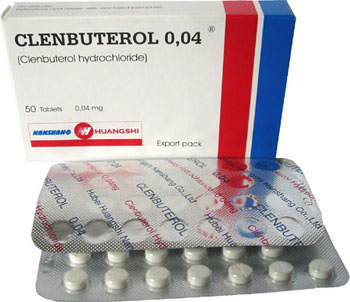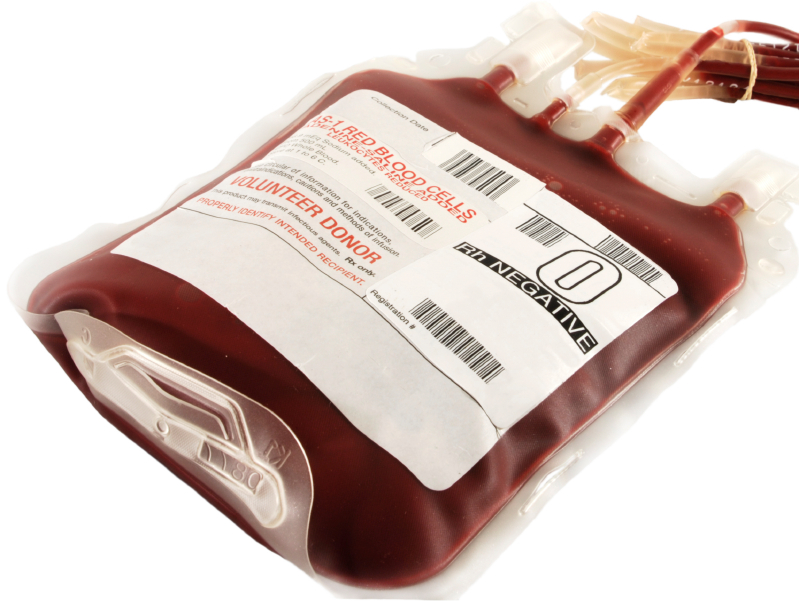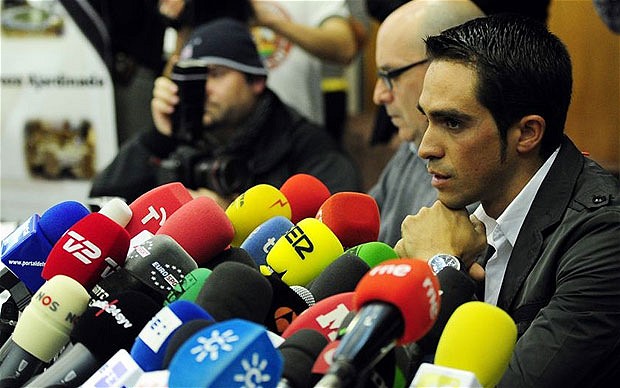In the welter of knee jerk reactions to judge/condemn Contador and his Clenbuterol and/or criticize the UCI the real issues of this situation are being missed; there are two main points that I can see.

Justice – The Wikipedia definition seems fair to me:
“Justice is a concept of moral rightness based on ethics, rationality, law, natural law, religion, or equity, along with the punishment of the breach of said ethics; justice is the act of being just and/or fair.”
One of the central tenets of English justice is, ‘Blackstone’s Formulation‘ (also known as Blackstone’s ratio or the Blackstone ratio):
“better that ten guilty persons escape than that one innocent suffers“,
expressed by the English jurist William Blackstone in his Commentaries on the Laws of England, published in the 1760s.
Continuing with the legal theme, ‘beyond reasonable doubt‘ is the extent to which the prosecution must deliver their evidence in a criminal case in England to secure a conviction.
And note that the burden is upon the prosecutor to prove guilt, not the accused to prove innocence; the organizations involved in this case have reversed justice so that Contador must prove his innocence.
In English civil law the bar is set a little lower, ‘balance of probability’ is the measure.
Consistency is the other quality which is sadly lacking in the way that doping offences are dealt with.
Let’s look at this aspect first.

Contador gets a two year ban, back dated; but the CAS verdict says that it feels he accidentally ingested the substance through a contaminated supplement.
However we know that ISD rider Alessandro Colo received a one year ban for a Clenbuterol offence after racing in Mexico, where 18% of meat is thought to contain traces of the substance – the Italian provided expert testimony to back this up.
Meanwhile, Ezequiel Mosquera festers for a year before the verdict is delivered and is then banned for two years from that date.
Contador and Keisse are pursued with fanatical zeal, whilst ‘other riders’ were ‘known to be clean, all along.’
There was a case in Scottish football last year where a player failed a test, provided an argument that it was a contaminated supplement and was back playing within weeks – backed by an indignant club chairman and Scottish football Press.
This lack of a solid, common standard to be applied in all cases and in all sports is inequitable at best, a breach of human rights at worst – but perhaps that’s why certain organizations base themselves in Switzerland, where European Law and its bias towards the rights of the individual do not apply.
The Belgian Sporza sports news agency asked a professor of jurisprudence specializing in workers’ rights for his opinion on the situation.
He stated that if Contador could get his case before the European Court of Civil Rights then there’s little doubt that he would win.
But let’s go back to justice and look for a moment at the villain of the piece – the ‘C word.’

The jargon goes like this;
“Clenbuterol is a β2 agonist with some structural and pharmacological similarities to epinephrine and salbutamol but its effects are more potent and longer-lasting as a stimulant and thermogenic drug.
“It causes an increase in aerobic capacity, central nervous system stimulation, and an increase in blood pressure and oxygen transportation.
“It increases the rate at which body fat is metabolized while increasing the body’s BMR.
“It is commonly used for smooth muscle relaxant properties.
“This means that it is a bronchodilator and tocolytic.”
The most likely reason being touted as to why Contador would have taken the stuff was to ‘rip’ off the last few kilos to get down to his fighting weight.
We were helpfully reminded of this possibility by a nameless Astana staffer – with friends like that on your team, who needs enemies?
But what of Contador’s claim that he ingested the substance from contaminated beef?
Bear in mind that Colo proved his argument on Mexican beef then have a look at the following.
“In March 2011, China’s Ministry of Agriculture (MOA) said that the government would launch a one-year crackdown on illegal additives in pig feed, after a subsidiary of Shuanghui Group, China’s largest meat producer, was exposed for using clenbuterol-contaminated pork in its meat products.
“A total of 72 people in central Henan Province, where Shuanghui is based, were taken into police custody for allegedly producing, selling or using clenbuterol.”
And whilst Mexico and China aren’t Spain, it does show that contamination is not an imagined factor.
And the argument the ‘Spanish beef is tested’ doesn’t hold – much of the beef in Spain comes from Argentina and we’ve heard no mention of their testing procedures during this affair.

On the subject of the testing procedure, how is it possible to differentiate whether the Clenbuterol came from re-injected blood (which Contador’s doctors’ may have vetted when they took it from him, but didn’t have as sophisticated testing equipment as the lab that eventually tested him positive) and contaminated meat?
Ah! I hear you say; ‘what about the molecules of plastic in the blood?‘
The answer is that I don’t know, and unless you’re a bio-chemist, neither do you.
And let’s even set aside the argument that the tests haven’t been approved, yet
What I do know is that advice was issued in Europe telling the public to be wary of eating too much margarine and butter from plastic tubs because the plastic molecules migrate into the contents and from there into the consumer’s system.
The bottom line is that I don’t know if Contador deliberately doped or not.
And in my opinion, given some of the variables I’ve quoted above, the case is not ‘beyond reasonable doubt‘ nor does it sufficiently disturb the scales to give a ‘balance of probability‘ one way or the other.
But if you’re a responsible journalist you really should get a second opinion before you put your words ‘out there’ if it’s a specialist subject which you don’t have a full understanding of.
Here’s what an expert in the field of bio-chemistry has to say about my musings:
“Clenbuterol is an age-old pharmacological compound.
“As mentioned, it’s a Beta 2 agonist and causes only bronco dilation (opening of lung airways) as used in treating Asthma (Salbutamol).
“The main side effect is increased heart rate due to the beta receptors in the heart. When activated by the drug it causes the heart to pump faster and harder.“Clenbuterol is used in body building with DHP to induce increase in basal metabolic rate, i.e. induce thermo genesis… heat increases due to energy burning, with a good diet equals weight loss. But hey! Bert and others don’t need weight loss. It’s a bad drug for endurance athletes… it kills muscle function by blocking glycogen metabolism in preference for ATP/ADP metabolism.
“The cell biochemistry is very complicated but the bottom line is Bert wasn’t using this for weight loss!
“As part of a cocktail: with GH, Insulin and a Beta 2 agonist.
“But why Clenbuterol? We know the substance is used as an anabolic in cattle feed, hence trace amounts found in meat. Surely Bert wouldn’t use Clenbuterol – wouldn’t he use Salbutamol? From an inhaler perhaps… Clenbuterol is a black market drug produced underground or by poorly regulated Chinese and Indian pharmaceutical companies for the animal feed market; he wouldn’t knowingly use Clenbuterol.
“The drug would be cleared very quickly (overnight, so legs are good next day) increasing cell metabolism by enough to quicken recovery.
“Think about tired cells needing energy to recover… give it excess sugar (fuel) and Insulin to get the sugar in, Clenbuterol to drive cell metabolism with ongoing GH and that all equals fast recovery.
“If I told you if you rode a six hour stage today in the Tour and if you follow a easy protocol you can have better legs tomorrow than you did today prior to the six hours – well, that’s what the above combination has the potential to offer.
“Interesting fact: in the 2009 Tour almost 50% of the riders had therapeutic exemption certificates (TUEs) for Salbutamol – if you surveyed the population in general, of the first 100 people in the street three or four may have asthma.”
Given what ‘our man’ says perhaps it does move the scales a little towards the side marked ‘it’s possible he took it‘ but then he doesn’t agree with the weight loss argument.
This simply underscores my point, it’s all far from black and white – so what’s to be done?

Despite the belief of many – including the writer – that the sport is ‘cleaner’ than ever, the scandals which do erupt are of such magnitude that they grab huge headlines.
Last Monday morning there was little to be read in Copenhagen about local rider Marc Hester’s triumph in the Six Day – but headlines and page upon page about Contador/Saxo Bank/Riis.
The first thing that has to be developed within cycling and from the top down is a sense of priorities – the sport is not being ripped apart due to a lack of races in China.
Lines of communications must be cleared, trying to get a straight answer or even speak to the relevant person within the UCi is well nigh impossible – and don’t take my word for it: speak to those who have applied for a licence for team, have a complaint about a team or have fallen foul of the doping or whereabouts rules.
The UCI must – as the constitution states – defend the interests of the sport, there’s no point in cycling ‘hanging ’em high’ if tennis and football can’t see the problems and do little to deal with them.
Other sports are happy to see cycling take the flak whilst they pontificate that; ‘there’s no real drugs problem in our sport.’
That has to change.
Guidelines should be circulated to all teams on the risks of accidentally ingesting proscribed substances in countries which have a problem – for example China and Mexico.
- Instead of frame manufacturers having to jump through hoops and pay large sums of money so as little ‘UCi Approved’ stickers can be affixed to the top tube, the UCi should have a list of approved supplement suppliers whose products meet strict criteria. If a rider chooses to stray from that list then it’s his problem and there’s no argument about ‘contamination.’ I can’t recall a major scandal caused because a rider’s bike was too light or his frame broke.
- Suspensions should apply from the moment the ‘B’ sample is tested (if it’s [+ve] obviously). Allowing a rider to race and accumulate palmarès which are subsequently eradicated makes a mockery of the sport and opens up more cans of worms in the form of arguments about prize money being returned.
- The whole defence/appeal procedure should be analysed and tightened up; the amount of time which passed until a final verdict was reached on Contador was ridiculous. : The rider should be aware of his fate as quickly as possible – lawyers paid thousands of Euros per day will obviously do little to expedite things.
- In the event of a rider being found to have committed an offence there should be clear, uniform punishments applied which are commensurate with the offence.
If you don’t agree with what I suggest then that’s you prerogative – but don’t just criticise our writing, come up with your own suggestions, petition your National Federation, write to the UCi…
Change is needed, but it won’t happen without voices being raised.
And as for the ‘Whereabouts’ system? – we’ll save that for another day.
* * *
Addendum
We were passed this release on Associated Press, which brings yet another aspect to consider:
German Lab Shows: Inadvertent Doping
LONDON – A study by a German doping laboratory has found that humans can inadvertently ingest clenbuterol from eating meat, a finding that would support claims by Alberto Contador and other athletes that contaminated beef caused their positive drug tests.
The German Sports University lab in Cologne – accredited by the World Anti-Doping Agency – is warning athletes of the risks of accidental clenbuterol doping when traveling to China.
The lab carried out an investigation that found that 22 out of 28 travelers returning to Germany from China tested positive for low levels of clenbuterol. The samples were tested between Sept. 15 and Jan. 15.
“The figures are most probably due to a food contamination problem, potentially caused by misuse of clenbuterol as growth promoter in stock-breeding,” the lab said in a statement.
Clenbuterol is on WADA’s list of banned substances as an anabolic agent that builds muscle and burns fat. It is also used by farmers to bulk up livestock.
In China, in particular, clenbuterol’s illegal use in farming is well documented.
The German findings were presented at a doping workshop Monday in Cologne. Prof. Wilhelm Schanzer, director of the Cologne lab, said the results will be submitted to sports federations for their consideration.
“We’ve shown there is a problem and that athletes should be careful,” Schanzer told The Associated Press in a telephone interview Tuesday. “You should try to be careful with those things that you eat.“
The Cologne study appears to offer the strongest proof yet that athletes can test positive inadvertently from food. It challenges WADA’s principle of strict liability, which holds that athletes are responsible for all substances found in their body.
The German table tennis federation recently decided not to ban Dimitrij Ovtcharov after he blamed his positive clenbuterol test on contaminated meat.
Dozens of Chinese athletes have tested positive for clenbuterol in the past three years and received bans despite claims of contamination.
Contador — whose samples were tested at the Cologne lab last year — blamed his positive clenbuterol test at the Tour de France on eating beef that was brought across the border from Spain.
He was cleared of doping last Tuesday by the Spanish cycling federation, which reversed an earlier recommendation to suspend him for one year.
Schanzer stressed that the Cologne study did not involve athletes. He declined to comment on Contador or any specific cases.
“We only made a scientific investigation, and it’s up to federations to decide how this issue will be handled,” he said. “We are delivering scientific data independent from any case, so this problem should be discussed and people should be aware of this problem, especially in sports drug testing.”
Schanzer said the people tested in the study were told they could eat whatever they wanted. They came from Hong Kong, Shanghai, Beijing and other cities.
“There was no clear trend,” he said, adding that researchers plan to expand the study to a larger group.
Schanzer said the clenbuterol problem appears mainly centered in China and possibly in Mexico – “those countries which had a problem with illegal substances for animal feeding.”



